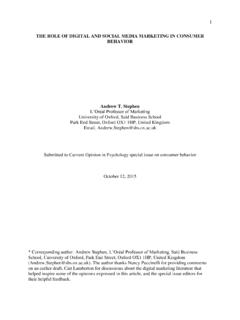Transcription of COMMON SENSE PSYCHOLOGY QUIZ ANSWERS ALL OF …
1 COMMON SENSE PSYCHOLOGY quiz ANSWERS . ALL OF THE BELOW STATEMENTS ARE FALSE. AND ARE MYTHS BASED ON COMMON SENSE NOTIONS. T F 1. The titles psychologist and psychiatrist refer to the same profession. FALSE: A psychologist attends graduate school and is trained primarily in research, statistics and talk therapy for those pursuing a clinical route. A psychiatrist attends medical school and is primarily trained in biology, medicine and prescribed medication. T F 2. Psychologists study behavior and the mind, but not biology. FALSE: Psychologists study many things including both social (environmental) influence and biological and physiological influences on human behavior and are also interested in examining the interaction . between biology and environment. T F 3. Some people never dream. FALSE: Dreams are quite COMMON and although many people will not remember their dreams it is impossible that someone or a particular individual has never dreamed during their sleep over the course of their life.
2 In fact, since everyone dreams to a certain extent during their sleep, dream analysis or dream interpretation was a famous form of psychoanalysis during the early 1900's. T F 4. When we sleep, the brain sleeps as well. FALSE: Sleep is categorized into REM and NREM sleep. During NREM sleep brain delta waves are active and brain activity is recorded during this division of sleep. T F 5. Negative reinforcement is the same as punishment. FALSE: Negative reinforcement is the removal of a negative stimulus, which in turn rewards (reinforces) and increases the likelihood of a behavior to reoccur. Punishment is the application of a negative stimulus, which in turn decreases the likelihood of a behavior to reoccur. T F 6. We can't do much to improve our memory. FALSE: Research shows that many mental and cognitive tasks such as rehearsal, repetition, word puzzles, etc.
3 , not only help improve memory but also keep it from degrading or getting worse. T F 7. Eyewitness testimony is some of the best evidence used by police and in court trials. FALSE: Research shows that many eyewitness memories can be false, implanted, distorted or made-up. Many after the fact events and experiences can lead individuals to form new memories inconsistent with the real events or distorted ones that are not truly representative of the true events which occurred. T F 8. In order to be creative, a person must be very intelligent. FALSE: According to psychological researchers like Howard Gardner, Robert Sternberg, Daniel Goleman and others, there are multiple forms of intelligence and many different to your traditional IQ measures of intelligence. Being creative is a form of intelligence considered to be separate from your traditional IQ.
4 T F 9. A person's intelligence is partially determined by brain size. FALSE: Brain size and intelligence are not related. T F 10. Instinct determines many of our behaviors. FALSE: Many factors determine our behaviors beyond instincts.. T F 11. We can train infants to walk at an early age ( , 4 or 6 months of age). FALSE: The average infant does not have the motor and central nervous system capacity to walk until they are 11-12 months old (average range 9-17 months). Although early movements, training and environmental conditions do contribute to motor development it does not eliminate the prior need for the infant to be ready physically to walk ( , bone growth, strength, central nervous system development, etc). T F 12. There is not much society can do to help the mentally retarded. FALSE: Many types of special education programs, therapies and social skills training have been found to improve the social interactions of the mentally retarded.
5 T F 13. All psychologists do is therapy. FALSE: It is estimated that 50% or less of all psychologists have ever done therapy with a patient. Many psychologist are employed in non-clinical work such as teaching in colleges and universities, FBI, police departments, sports' teams, research marketing firms, etc. T F 14. Shock treatment is often used for people with anxiety. FALSE: This type of treatment is rare and only done in very few sever cases of depression and not with any other type of psychological ailments like anxiety disorders. T F 15. A correlation between two variables means that one of those variables causes the other. FALSE: A correlation is a systematic relationship between two or more variables. You cannot infer causations from correlations. Causation can only be inferred through carefully designed and implemented experimental research.
6 T F 16. Most of us would not follow instructions from an authority figure to hurt another person. FALSE: A substantial amount of research beginning with the pioneering studies of Stanley Milgram during the 1960's, shows that the majority of normal people would carry out orders to do harm onto others when explicitly ordered or instructed to do so by an authority figure ( , scientist, doctor, police, etc.). T F 17. Opposite types of people attract each other (opposites attract). FALSE: Research shows that similarity along with proximity and attractiveness of individuals draws people together. The notion that opposites attract people to each other is a myth and there is an old saying that says, opposites attract and then they attack! . T F 18. A person with schizophrenia has a split personality. FALSE: Schizophrenia refers to a number of psychotic disorders with various cognitive, emotional and behavioral manifestations.
7 T F 19. Most old people have some degree of senility. FALSE: Many old people continue to work and live active and healthy lifestyles way into their 70's and 80's. The age of retirement and average lifespan has also dramatically increased over the years with improvements in technology, diet, medication, nutrition and medical assistance. T F 20. People with hypochondriasis (somatoform disorder) pretend to be sick. FALSE: This disorder refers to an imagines suffering of physical illness or, more generally, an exaggerated concern with one's physical health. T F 21. You can't change people's attitudes, opinions or beliefs. FALSE: Research shows that many attitudes, beliefs, prejudices, etc., are learned through the media, socialization, culture, etc., and can also be unlearned.. T F 22. If you spank or hit children when they misbehave it will make them more responsible and they will no longer misbehave.
8 FALSE: Contrary to popular belief, corporal or physical punishment does more harm than good for the child's development and does not teach responsibility and instead teaches violence, avoidance, etc. Please visit for more information. T F 23. People who rape do so because they have a strong craving for sex.. FALSE: Research shows that the primary reinforcing and influencing factor of rape is power, control and domination of another individual and not the sexual factor. T F 24. All your memory abilities fade and become worse with increasing age. FALSE: Memory comes in different types and forms and not all memory fades with age. Episodic Memory or memory for personal episodes or events in one's life fades or weakens with age. However, other forms of memory like Semantic Memory or memory for generic information like world facts and vocabulary words shows improvement and enhancement with increasing age.
9 T F 25. Mutual attraction or love is the most important desired characteristic in a potential marriage partner or spouse across all cultures. FALSE: Although in Western countries like the US this appears to be true it is still not the universal truth. In fact, in many non-western countries like China, India, Pakistan, etc., love is given much less importance in comparison to other characteristics such as family, education, chastity, etc. T F 26. You are more likely to get help if there are more people around you. There is safety in numbers. FALSE: Research shows that the phenomenon of diffusion of responsibility or bystander apathy often occurs in large groups or crowds causing individuals in need of help ( , victim) to be less likely to receive the assistance they need from those around them. T F 27. Homeless are lazy, don't want to work and enjoy living on the streets or in cardboard boxes.
10 FALSE: Many homeless suffer from mental illnesses, financial or family problems, drug addictions, gambling problems, discrimination, etc., and contrary to popular belief they really do not enjoy living in the streets or in cardboard boxes. T F 28. If someone already has a lot of money they are not going to steal your money because they don't need it. FALSE: Antisocial personality and other psychological disorders are some of the reasons con-artists and thieves steal and not because they necessarily need or don't need the money. T F 29. The elderly do not enjoy or have sex. FALSE: Many elderly and senior citizens continue to enjoy and have sex for many years. Elderly males have been known to father children in their seventies and eighties. In the case of elderly females their biological menopause status helps make sex for them more enjoyable and less stressful when the possibility of an unwanted pregnancy is removed.




